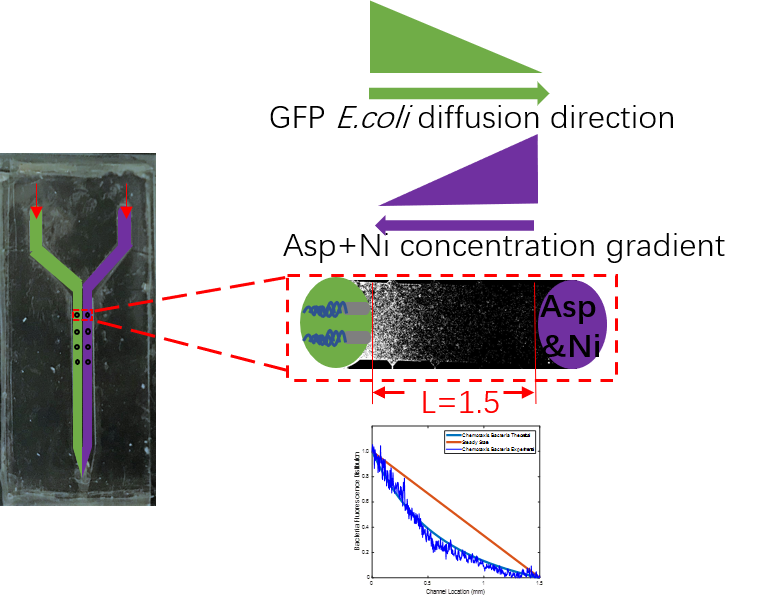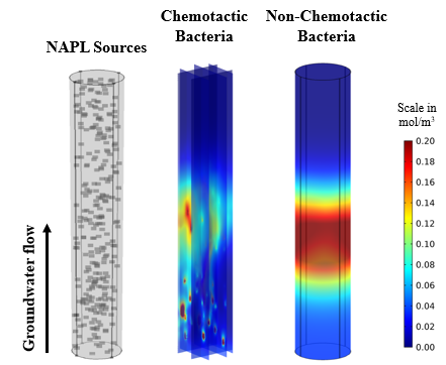Research Projects
The Ford group studies chemotaxis and its applications to environmental and medical systems.
Bacterial infection of lung mucus
As Pseudomonas aeruginosa bacteria penetrate the protective layer of lung mucus, they compete with other microbes for available nutrients. In some cases, they benefit from metabolic processes of other microbes in the biofilm, which ultimately makes antibiotic treatments less effective. We use computational models to relate changes in internal metabolic reactions to external environmental conditions as well as the growth, spread and interaction of microbial populations. We will explore complementary metabolic functions of microbes in mucus in the lung mucus microenvironment using techniques such as spatial transcriptomics and metabolomics. This knowledge will inform treatment options for infections in cystic fibrosis patients. This project will contribute to a larger NIH-sponsored award in collaboration with UVA BME, MIT and Emory University researchers who have expertise in metabolic modeling, agent-based modeling, mucins, and Pseudomonas aeruginosa. The Ford Lab is also affiliated with UVA’s NIH Biotechnology and Systems Biology & Data Science Training Programs.

Kuper TJ, Islam MM, Peirce-Cottler SM, Papin JA, Ford RM (2024) Spatial transcriptome-guided multi-scale framework connects P. aeruginosa metabolic states to oxidative stress biofilm microenvironment. PLoS Comput Biol 20(4): e1012031. https://doi.org/10.1371/journal.pcbi.1012031
Biofilm behavior in complex natural environments
Studying biofilms in their natural environments, such as contaminated sediment, is challenging because these environments are highly complex and hard to see through. To overcome these challenges, we use high-resolution x-ray imaging (micro-CT) and special contrast agents to get detailed 3D images of biofilms growing within packed-beds of sand or beads. This allows us to measure and analyze the structure and growth of biofilms in detail. We also use cutting-edge deep learning techniques, like Convolutional Neural Networks and Generative Adversarial Networks, to improve the speed and accuracy of our imaging. These methods help us quickly and reliably distinguish between different materials (biofilm, air, water, and solid) and reduce radiation exposure to prevent damage to the samples. This project aims to test the idea that microbial communities in biofilms can communicate and move within their environments to better respond to stress, such as a lack of water. By turning on and off specific genetic traits in a biofilm-forming microbe S. oneidensis, we can see how important abilities like movement and communication are for the survival of the biofilm community. Collaborators at Oregon State University and University of New South Wales bring expertise in micro-CT and deep learning techniques to this DOE-sponsored project.

Gao B, Wang X, Ford RM (2023) Chemotaxis along local chemical gradients enhanced bacteria dispersion and PAH bioavailability in a heterogenous porous medium. Science of The Total Environment 859(1) 160004. https://doi.org/10.1016/j.scitotenv.2022.160004
Gao B, Taghizadeh E, Wood BD, Ford, RM (2022) Transport of chemotactic bacteria in granular media with randomly distributed chemoattractant-containing NAPL ganglia: Modeling and simulation, Advances in Water Resources,159, 104065. https://doi.org/10.1016/j.advwatres.2021.104065
The Role of Chemotaxis in Marine Microorganism Transport Toward Hydrocarbon Component in An Oil Spill

Chemotactic bacteria have the ability to sense the hydrocarbon pollutant gradient, swim toward it and further degrade hydrocarbons. This process can increase the mass transfer of chemotactic bacteria to the hydrocarbon pollutants and can increase biodegradation. The objective of this research is to quantify bacteria motility and chemotactic parameters in order to understand what extent does chemotaxis contribute to increasing the transport process of hydrocarbon-degrading marine bacteria to oil droplets. This proposed work is important to understand the extent to which bacterial chemotactic processes contribute to marine bacteria migration to hydrocarbons. It will also provide information on bacteria migration in complex contaminated marine environment.
Bacterial chemotaxis toward discrete hydrocarbon sources

Chemotactic bacteria can migrate preferentially to attractants like hydrocarbons, and potentially increase the efficiency of bioremediation in contaminated area. This study aims at multiple length and time scales to investigate the conditions where chemotaxis will overcome the mass transfer limitation in the biodegradation reaction. Numerical simulation was utilized to visualize bacterial distributions inside a sand column packed with discrete hydrocarbon sources. Two microfluidic devices were designed and fabricated to directly observe bacterial behaviors near 1) oil droplets trapped in a heterogenous media and 2) an oil-water interface, respectively. We hypothesize a dimensional scaling method to relate the observations in different length and time scales. This method can help evaluate the importance of chemotaxis for in situ treatment.